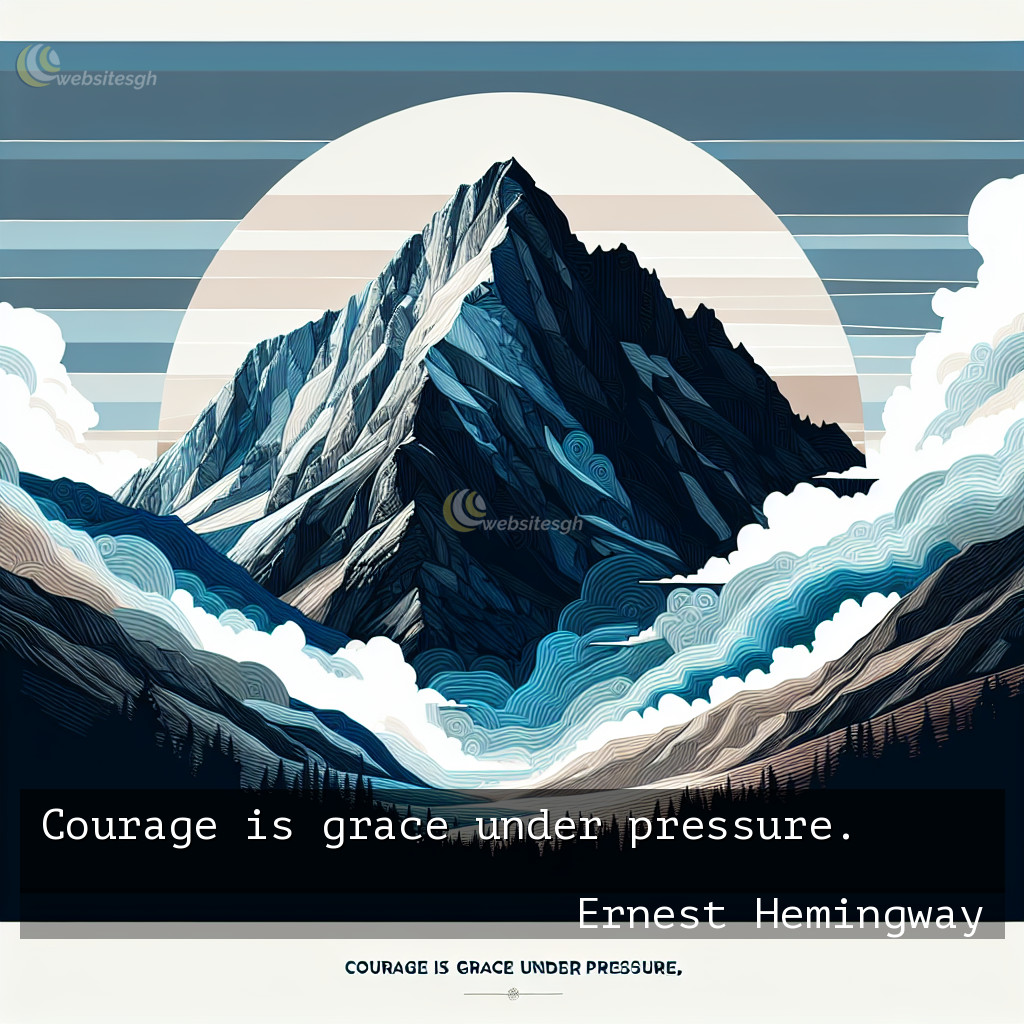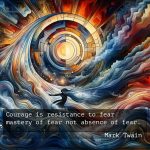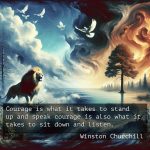This website uses cookies so that we can provide you with the best user experience possible. Cookie information is stored in your browser and performs functions such as recognising you when you return to our website and helping our team to understand which sections of the website you find most interesting and useful.

Ernest Hemingway quotes on Courage

Ernest Hemingway quotes on Courage
Courage is grace under pressure.
By: Ernest Hemingway
Imagine you’re standing at the edge of a diving board, high above the water’s surface. Your heart is pounding, your palms are sweaty, and the world seems to be watching. Taking that leap requires more than just the physical act of jumping—it requires courage. Ernest Hemingway once said, “Courage is grace under pressure.” This simple yet profound statement encapsulates the essence of bravery in the face of adversity. It’s not just about being fearless but about handling fear with dignity and strength.
Understanding Courage
Courage is often misunderstood as the absence of fear. In reality, courage is about confronting fear, uncertainty, and discomfort and then taking action despite those feelings. It’s the firefighter rushing into a burning building to save lives, the student standing up to a bully despite the risk, or even the child taking their first ride on a bicycle without training wheels. Courage is about maintaining composure and grace when every instinct tells you to panic or run away.
Grace Under Pressure in Everyday Life
While we may not all face life-or-death situations, we encounter moments that test our courage daily. It could be presenting a project in front of a class, asking for a promotion at work, or even admitting a mistake. These situations pressurize us, squeezing the air out of our lungs and making our minds race. But it’s in these moments that grace becomes our ally. Grace is that poised, calm state of mind that allows us to breathe, think clearly, and act with intention.
Building Courage Through Practice
Like any skill, courage can be developed with practice. Start with small challenges that push you slightly out of your comfort zone. Speak up in a meeting, try a new activity, or strike up a conversation with a stranger. Each act of bravery, no matter how small, is like a muscle flex that builds your courage over time. As you accumulate these experiences, you’ll find that your capacity to handle pressure with grace grows.
Embracing Failure as a Path to Courage
One of the most significant barriers to courage is the fear of failure. But what if we reframe failure as a necessary step on the path to success? Every misstep is an opportunity to learn, grow, and become more resilient. When we accept that failure is not the opposite of success but part of the journey, we free ourselves to take risks and embrace challenges with open arms.
The Ripple Effect of Courage
Courage is contagious. When one person demonstrates grace under pressure, it inspires others to do the same. This ripple effect can transform classrooms, workplaces, and communities. By choosing courage, you’re not only improving your own life but also setting a powerful example for those around you.
Staying Motivated on the Courageous Path
Maintaining motivation can be tough, especially when the pressure mounts. It’s important to celebrate your victories, no matter how small, and to remember your ‘why’—the reason you’re pushing through the fear. Surround yourself with supportive people who encourage your bravery, and don’t hesitate to seek inspiration from stories of others who have faced their fears.
Conclusion: The Beauty of Grace Under Pressure
Courage is not about being unshakeable; it’s about shaking and then steadying yourself. It’s about facing the dive, the presentation, the challenge, and choosing to move forward with grace. Hemingway’s words remind us that courage is an art—a dance with fear that, when performed with grace, becomes a testament to the strength of the human spirit.
FAQs about Ernest Hemingway on Courage
- What did Ernest Hemingway mean by “courage is grace under pressure”?
Hemingway meant that true courage is not about being fearless but about handling fear, stress, and adversity with composure and dignity. It’s about maintaining a calm and graceful demeanor even when under significant pressure.
- Can courage be learned or is it an innate quality?
Courage can definitely be learned and developed over time. By gradually facing fears and stepping out of one’s comfort zone, individuals can build their courage much like a muscle.
- How can I show courage in my everyday life?
You can show courage by taking on new challenges, standing up for what you believe in, admitting when you’re wrong, and trying new things that might scare you. Each act of bravery, no matter how small, contributes to your overall courage.
- Why is it important to maintain grace when under pressure?
Maintaining grace under pressure is important because it allows you to think clearly, act intentionally, and maintain your composure. This can lead to better decision-making and can inspire others to act courageously as well.
- How can failure help build courage?
Failure can help build courage by teaching resilience and providing valuable lessons. When failure is seen as a part of the learning process, it becomes less intimidating and can encourage taking calculated risks.
- What are some ways to practice courage?
Some ways to practice courage include setting and achieving small goals that challenge you, engaging in public speaking, trying activities that scare you, and standing up for yourself and others in difficult situations.
- How does courage affect those around us?
Courage has a ripple effect, inspiring and motivating others to also act bravely. When one person demonstrates courage, it can empower others to overcome their own fears and act with courage as well.
- What role does support play in building courage?
Support from friends, family, and mentors is crucial in building courage. It provides a safety net that encourages individuals to take risks and reassures them that they are not alone in facing their fears.
- Is it okay to feel fear when trying to be courageous?
Yes, feeling fear is a natural part of being courageous. Courage is not about the absence of fear but about facing and overcoming it. Feeling fear is a sign that you are stepping out of your comfort zone, which is where growth happens.
- Can showing courage lead to personal growth?
Definitely. Showing courage leads to personal growth by pushing you to face challenges, learn new skills, and adapt to new situations. This growth can increase self-confidence and lead to further courageous actions.








